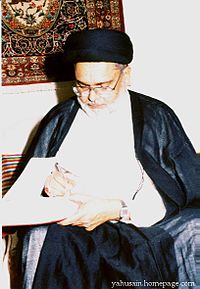Zeeshan Haider Jawadi
Syed Zeeshan Haider Jawadi | |
|---|---|
 | |
| Born | 17 September 1938 |
| Died | 15 April 2000 (age 61) Abu Dhabi, UAE |
| Academic background | |
| Alma mater | Jamia Nazmia, Lucknow, India |
| Influences | Muhammad Baqir al-Sadr |
| Academic work | |
| Era | Modern era |
| Discipline | Islamic scholar |
| School or tradition | Twelver |
| Main interests | Islamic law, Islamic philosophy, Quranic exegesis, Hadith, Theology, Mantiq |
| Notable works | Translation and commentary (Tafsir) of Quran, Nahj Al-Balagha and Sahifa Al-Kamila (Sajjadia), Nuqoosh Al-Ismat. |
Syed Zeeshan Haider Jawadi (17 September 1938 – 15 April 2000)[1] was an Indian Islamic scholar, religious leader, public speaker, Qur'anic interpreter, Urdu poet, historian and philosopher of Shia Islam.
Biography
[edit]Syed Zeeshan Haider Jawadi (also known as Allama Jawadi) was born in Allahabad on 17 September 1938 in town Karari, Dist. Allahabad (now Karari, Dist. Kaushambi, Uttar Pradesh, India.) . He started his primary education at Jamia Amjadia Karari, Allahabad and continued his Islamic education at Jamia Nazmia in Lucknow and after finishing his studies there, Allama Jawadi moved to Najaf-e-Ashraf (Iraq) for higher studies, as Najaf was the best Islamic learning center of that time and he stayed under the patronage of his brother Maulana Syed Ali Abid Rizvi until 1961. Muhammad Baqir al-Sadr taught him Islamic philosophy and other Islamic sciences.
He was dean of the India Shi'ite elementary and theological schools, which numbered 40 in 1993.[2]
He died at the age of 62 on 15 April 2000.[citation needed]
Personal life
[edit]Jawadi's son, Ehsan Jawadi, a Shia scholar who regularly presented on the Win Islam TV channel, died in 2018.[3]
Works
[edit]- Anwar Al-Quran (Translation and Commentary on Quran)
- Women and Shari'at (Divine Law): Complete Rules Regarding Women, in Islam (1999)[4]
- Nahj Al-Balagha (Translation and commentary)[5][6][7]
- Al-Sahifa al-Sajjadiyya (Translation)
- Iqtisaduna (Translation)[8]
- Al-Bank al-Ribawii al-Islam[8]
- Imam Jafer Sadiq(as) aur mazahib e Arbaa (Urdu:امام جعفر صادقؑ اور مذایبِ اربعہ)[9]
- Ahl Al-Bait - Quran aur Sunnat ki raushni mein (Translation)[10]
- Nuqoosh e Ismat
- Life sketch of fourteen infallibles (English translation of Nuqoosh e Ismat)[11]
- MiraturRashad (Translation of Wasiyatnama, Last Will & Testament By Ayatullah Shaikh Abdulla Mamkani)
- Karbala Shenasi (Compilation of Speeches given in London)[12]
- Mehfil o Majalis [13]
References
[edit]- ^ "Allama Syed Zeeshan Haider Jawadi, the Great Alim from India || Imam Reza (A.S.) Network". www.imamreza.net. Retrieved 14 January 2019.
- ^ Durrany, K. S. (1993). Impact of Islamic Fundamentalism. Christian Institute for the Study of Religion and Society. p. 135. ISBN 9788172140632.
- ^ "Senior Indian Shia scholar 'Maulana Syed Ehsan Jawadi' passes away". AhlulBayt News Agency. 30 May 2018.
- ^ Talattof, Kamran (2011). Modernity, Sexuality, and Ideology in Iran: The Life and Legacy of a Popular Female Artist. Syracuse University Press. p. 212. ISBN 9780815651390.
- ^ Jawadi, Syed Zeeshan Haider (2007). Nah Al-Balagha (in Urdu) (Third ed.). Qom, Iran: Ansariyan Publications. ISBN 9789644380921.
- ^ "NAHJUL BALAGHA - Shia Multimedia". shiamultimedia.com. Retrieved 14 January 2019.
- ^ Waseem, Shah Mohammad; Naqavi, S. Ali Mohammad (1997). Nahjul balagha and inter-religious understanding. Renaissance Publishing House. p. xxiv. ISBN 9788185199641.
- ^ a b Khan, Mohd Lateef (supervised by Manzoor Ahmad Bhat) (2011). Economic Thought of Muhammad Baqir al-Sadr: A Study of Iqtisaduna (Our Economics) (M.Phil). University of Kashmir.
- ^ "Imam Jafer Sadiq(as) aur mazahib e Arbaa - 2/2 امام جعفر صادقؑ اور مذایبِ اربعہ". Scribd. Retrieved 14 January 2019.
- ^ "Ahlebait". Scribd. Retrieved 14 January 2019.
- ^ Jawadi, Allama Syed Zeeshan Haider Jawadi; Rizvi, Sayyid Athar Husain S.H. (2011). Nuqoosh-e-Ismat - Life Sketches of the Fourteen Infallibles. Thane (Mumbai), MS, India: Allamah Jawadi Trust. pp. Cover page.
- ^ "Majalis Karbala Shanasi". Scribd. Retrieved 14 January 2019.
- ^ "Mehfil o Majalis". Scribd. Retrieved 14 January 2019.
Text is available under the CC BY-SA 4.0 license; additional terms may apply.
Images, videos and audio are available under their respective licenses.
